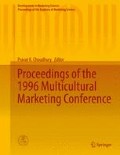Abstract
Idealized images of very shapely models are often used in advertisements to try to stimulate consumption. In a survey, only 12% of the subjects became interested in purchasing light-foods after being exposed to such an advertisement Subjects were categorized according to their desire to emulate or ignore these idealized images.
Access this chapter
Tax calculation will be finalised at checkout
Purchases are for personal use only
Preview
Unable to display preview. Download preview PDF.
Author information
Authors and Affiliations
Editor information
Editors and Affiliations
Rights and permissions
Copyright information
© 2015 Academy of Marketing Science
About this paper
Cite this paper
Aronsson, A.T. (2015). Idealized Images in Advertisements: Do Consumers Emulate or Ignore Them?. In: Choudhury, P. (eds) Proceedings of the 1996 Multicultural Marketing Conference. Developments in Marketing Science: Proceedings of the Academy of Marketing Science. Springer, Cham. https://doi.org/10.1007/978-3-319-17395-5_28
Download citation
DOI: https://doi.org/10.1007/978-3-319-17395-5_28
Publisher Name: Springer, Cham
Print ISBN: 978-3-319-17394-8
Online ISBN: 978-3-319-17395-5
eBook Packages: Business and EconomicsBusiness and Management (R0)

